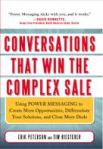You want to win. Whether you are an athlete, an actor or a business leader you are “in the game” to win. You might be competing in a major event (e.g. summer Olympics in London) or in a crowded market (e.g. productivity software); regardless, you want to win.
What does it take to set you apart from the competition? In sports it’s pretty easy; you win competitions (ok, it’s not ‘easy’ to win for most of us, but it’s easy to measure). In business it most often comes down to the bottom line; how well your products and services sell compared to your competition. Measuring is not easy, but it’s possible. You need to know how you’re organization is doing and then do what it takes to leave the competition in the dust.
 The book Conversations That Win The Complex Sale delves into the practices that lead to successful selling in complex situations. The concepts help you differentiate yourself and your products/services from the competition. “Rather than sell your own corporate story and brand vision, you need to tell customers their story—the one in which they are the heroes and they achieve success.”
The book Conversations That Win The Complex Sale delves into the practices that lead to successful selling in complex situations. The concepts help you differentiate yourself and your products/services from the competition. “Rather than sell your own corporate story and brand vision, you need to tell customers their story—the one in which they are the heroes and they achieve success.”
The authors of the book, Erik Peterson and Tim Riesterer, are also executives for Corporate Visions, the organization that is “all about helping companies, like yours, be different in a rapidly commoditizing marketplace.” The book and their training (which I attended this week) focus on three key areas that will help you create more opportunities, differentiate your solutions and close more deals:
The Power of Change: Helping you overcome the status quo, your biggest competitor. Focusing on intentions and instincts to help you understand your customers and prospects better. Bringing in “a little bad news” to help them care about what you’re doing. The right conversations help them want to change.
The Power of Story: Everyone lives in stories whether they know it or not. Connecting with your potential customers through stories keeps them engaged through the discussion and helps them see it from their perspective. You learn how to create power positions, engagement and heroes. You’ll learn why “you phrasing” is critical to closing the deal.
The Power of Message: It is human nature for people to be mostly engaged at the beginning of a presentation, mostly asleep during the meat of the presentation, and wide awake when they hear the words “in conclusion” (because it’s about over). The authors call this “the hammock” and give great methods of helping you keep your listeners engaged. You’ll learn why grabbers, big pictures and 3D props help your stories come to life, and how the right conversations pique the most important part of the brain that influences decision-making.
A short blog post cannot begin to convey the depth and meaning of this book, and especially not the value of the training. The training delves in-depth into each of the key areas that will help you win. The average ROI for companies that have gone through Corporate Visions training (which this book is based on) and apply it immediately is really high – so high I can’t bring myself to write it (you wouldn’t believe me). If you’re serious about winning, regardless of your position in the company, this book is a must-read.
—
The Product Management Perspective: Why is a sales training/messaging book important to product management? You work with sales all the time as a product manager. The principles in this book will not only help your sales team sell more effectively, but they will also help you “sell” more effectively to the sales team. You can plant the necessary information in their minds that will keep your products at the top of their list and help your company increase its success dramatically.



